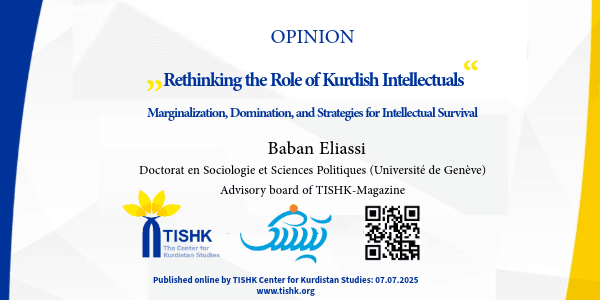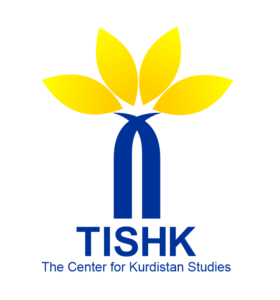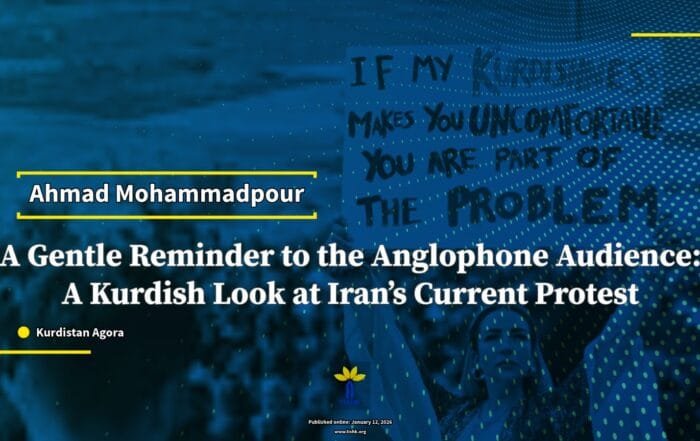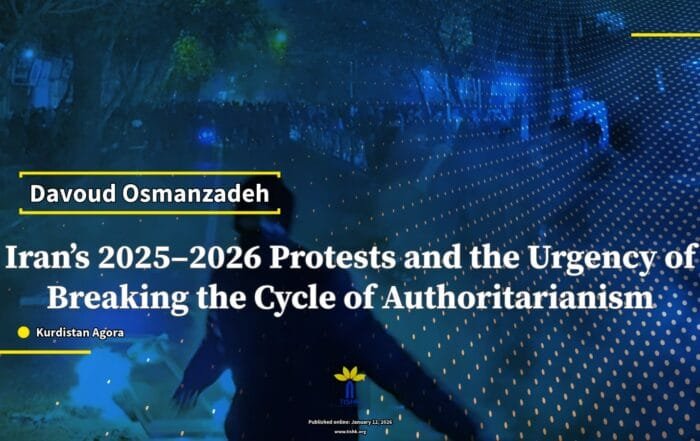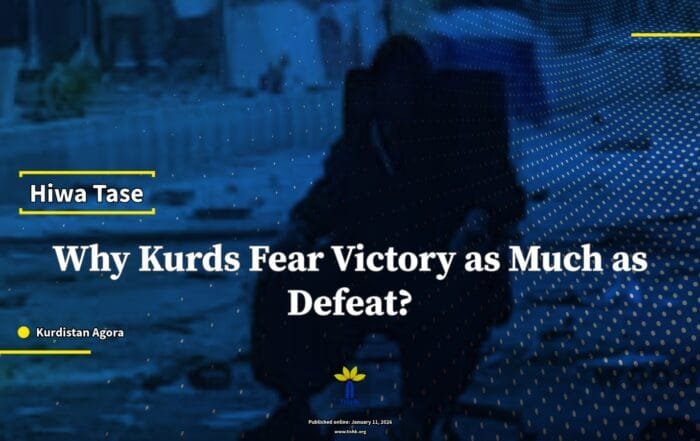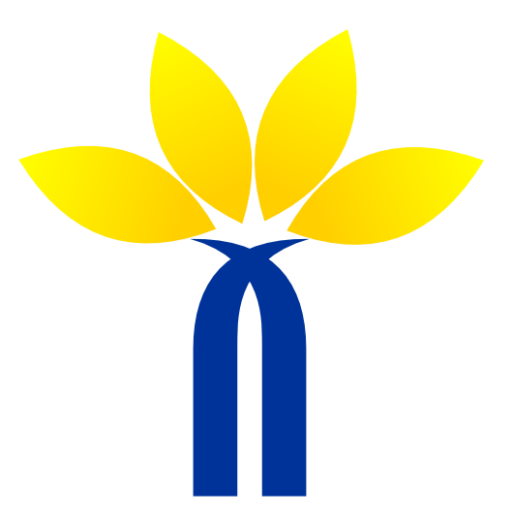OPINION
Rethinking the Role of Kurdish Intellectuals: Marginalization, Domination, and Strategies for Intellectual Survival
Published online by TISHK Center for Kurdistan Studies: 07.07.2025
DOI
Eliassi, Baban (2025): Rethinking the Role of Kurdish Intellectuals: Marginalization, Domination, and Strategies for Intellectual Survival. Kurdistan Agora. TISHK Center for Kurdistan Stdies.
Abstract/From the text
In the shadowed corridors of history, intellectuals from oppressed peoples—especially the Kurds—face a relentless and painful dilemma: how to forge critical, engaged knowledge deeply rooted in their lived realities, while navigating institutions—academic, media, political—governed by powers that dismiss, silence, or appropriate their voices. This text is addressed to Kurdish intellectuals, particularly those who feel drained, distanced, or hesitant to continue their struggle within systems that marginalize them, locked as they are in spheres dominated by ethnic or state elites.
.
Keywords: Symbolic Violence, Epistemic Disobedience, Kurdish Intellectuals, Linguistic Marginalization, Knowledge Sovereignty
Rethinking the Role of Kurdish Intellectuals: Marginalization, Domination, and Strategies for Intellectual Survival
In the shadowed corridors of history, intellectuals from oppressed peoples—especially the Kurds—face a relentless and painful dilemma: how to forge critical, engaged knowledge deeply rooted in their lived realities, while navigating institutions—academic, media, political—governed by powers that dismiss, silence, or appropriate their voices. This text is addressed to Kurdish intellectuals, particularly those who feel drained, distanced, or hesitant to continue their struggle within systems that marginalize them, locked as they are in spheres dominated by ethnic or state elites.
This reflection draws from the wisdom of thinkers like Pierre Bourdieu, Frantz Fanon, Walter Mignolo, and Miroslav Hroch to unravel the subtle yet brutal mechanisms that dishearten, neutralize, or co-opt Kurdish voices in the production of knowledge and symbolic power. It is an invitation to open a space of dialogue on the material, psychological, and political conditions of Kurdish intellectual engagement today.
Pierre Bourdieu taught us that domination is not only exercised through brute force but also through symbolic forms: the denigration of certain accents, knowledges, histories, or cultural referents. In academic and media arenas, Kurdish intellectuals are too often confined to a subordinate position—forced to express themselves in imposed languages (Persian, Turkish, Arabic) within theoretical frameworks that refuse the legitimacy of Kurdish experience as an autonomous source of knowledge.
This situation breeds internalized contempt and frequent self-censorship. Many Kurdish intellectuals end up unconsciously adopting the expectations of dominant elites, hoping for recognition or safety. Here lies the cruel power of symbolic violence: when the dominated consent to their own erasure to be tolerated in the public sphere.
A particularly poignant example of this linguistic marginalization is the hesitation some Kurds feel when speaking Persian. Fearful of not mastering the language perfectly—especially in conversations with native Persian speakers—they often preface their speech with apologies or disclaimers. This preemptive self-critique reveals an acute anxiety about being judged or dismissed based on their Persian fluency, reflecting deeper issues of exclusion and the psychological impact of linguistic domination.
Frantz Fanon, in The Wretched of the Earth, describes how colonized elites—often educated in colonial institutions—become alienated from their peoples through fatigue, frustration, or rejection of their origins. This tragic echo resonates deeply in the lives of many Kurdish scholars and journalists, who face invisible ceilings, infantilization, or folklorization of their discourse.
This disgust with engagement is amplified by solitude, lack of autonomous structures, and sometimes outright hostility from universities or media that demand neutrality, moderation, or alignment with dominant national narratives.
Historian Miroslav Hroch highlights how “established elites” systematically marginalize the elites of oppressed peoples, relegating them to subaltern or folkloric roles. Their demands are framed as threats to national unity or republican order. This lens helps us understand why Kurdish intellectuals are often tolerated only as long as they do not challenge the centralist frameworks that deny Kurdish reality.
Channels like Iran International TV or BBC Persian sometimes provide platforms to Kurdish journalists or analysts. Yet, this visibility comes with an implicit condition: adherence to a dominant national narrative. Kurdish intellectuals may speak, but rarely as Kurds bearing a truly critical perspective. They are invited to discuss geopolitics, religion, or social issues—but seldom to challenge the denial of Kurdish collective rights or contest the Iranian centralist ideology.
This conditional integration is a sophisticated mechanism of neutralization: it absorbs Kurdish voices while stripping them of their critical potential. Inclusive in appearance, this process is a subtle erasure. Against systemic marginalization, it is vital to assert that Kurdish thought is not meant to be a mere variable in dominant narratives. Walter Mignolo’s concept of epistemic disobedience calls for refusal of colonial modernity’s imposed frameworks, proposing knowledges grounded in different experiences.
Kurdish intellectuals must be free to produce, teach, publish, and debate in Kurdish, prioritizing their own references, pains, and hopes. This demands the creation and strengthening of Kurdish knowledge spaces—digital, editorial, institutional, and communal.
This text is not a reproach to those who have left academia or work in hostile environments. It is a call for collective clarity. We need Kurdish minds that are free, rooted, critical, and courageous. This will not come without conflict or pain. But it is essential for our political, historical, and cultural existence.
The time to beg for a place in others’ institutions is over. Now, we must claim our legitimacy to produce knowledge for and by ourselves.
Other Research
A Gentle Reminder to the Anglophone Audience: A Kurdish Look at Iran’s Current Protest
Ahmad Mohammadpour Published online by TISHK Center for Kurdistan Studies: Bonn, Germany: 12 January 2026 Summary In this short piece, I argue that Perso-Shi’a nationalism is a unified, singular racio-linguistic [...]
Iran’s 2025–2026 Protests and the Urgency of Breaking the Cycle of Authoritarianism
Davoud Osmanzadeh Published online by TISHK Center for Kurdistan Studies: Bonn, Germany: 12 January 2026 Summary This essay analyzes the protest cycle that began in Iran in late December 2025, [...]
Why Kurds Fear Victory as Much as Defeat?
Hiwa Tase Published online by TISHK Center for Kurdistan Studies: 11.01.2026 Summary For the Kurds of Eastern Kurdistan (Rojhelat), the possible fall of the Iranian regime brings a paradox of [...]

